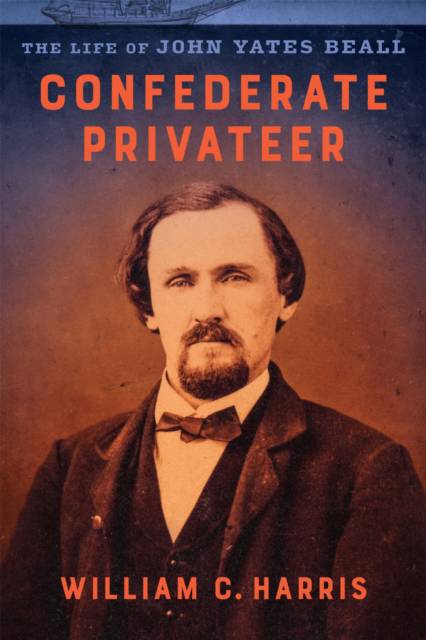
- Afhalen na 1 uur in een winkel met voorraad
- Gratis thuislevering in België vanaf € 30
- Ruim aanbod met 7 miljoen producten
- Afhalen na 1 uur in een winkel met voorraad
- Gratis thuislevering in België vanaf € 30
- Ruim aanbod met 7 miljoen producten
Omschrijving
Confederate Privateer is a comprehensive account of the brief life and exploits of John Yates Beall, a Confederate soldier, naval officer, and guerrilla in the Chesapeake Bay and Great Lakes region. A resident of Charles Town, Virginia (now West Virginia), near Harpers Ferry, Beall was a member of the militia guarding the site of John Brown's execution in 1859. Beall later signed on as a private in the Confederate army and suffered a wound in defense of Harpers Ferry early in the war. He quickly became a fanatical Confederate, ignoring the issue of slavery by focusing on a belief that he was fighting to preserve liberty against a tyrannical Republican party that had usurped the republic and its constitution.
Limited by poor health but still seeking an active role in the Confederate cause, Beall traveled to the Midwest and then to Canada, where he developed an elaborate plan for Confederate operations on the Great Lakes. In Richmond, Beall laid his plan before Confederate President Jefferson Davis and Secretary of the Navy Stephen Mallory. Instead of the Great Lakes operation, Mallory authorized a small privateering action on the Chesapeake Bay. Led by "Captain" Beall, the operation damaged or destroyed several ships under the protection of the U.S. Navy. For his part in organizing the raids, Beall became known as the "Terror of the Chesapeake." After Union forces captured Beall and his men, the War Department prepared to try them as pirates. But Secretary of War Edwin Stanton backed down, and Beall was later freed in a prisoner exchange. Organizing another privateering operation on the Great Lakes, Beall had some early successes on the water. He then hatched a plan to derail a passenger train transporting Confederate prisoners of war near Niagara, New York, but was captured before he could carry out the mission. The Union army charged Beall with conspiracy, found him guilty, and executed him. Harris's history of Beall offers a new view of paramilitary efforts by civilians to support the Confederacy. Though little remembered today, Beall was a legendary figure in the Civil War South, so much so that his execution was on John Wilkes Booth's list of reasons to assassinate President Abraham Lincoln. Based on exhaustive research in primary and secondary sources and placed in the context of more extensive Confederate guerrilla operations, Confederate Privateer is sure to be of interest to Civil War scholars and general readers interested in the conflict.Specificaties
Betrokkenen
- Auteur(s):
- Uitgeverij:
Inhoud
- Aantal bladzijden:
- 200
- Taal:
- Engels
Eigenschappen
- Productcode (EAN):
- 9780807180259
- Verschijningsdatum:
- 25/10/2023
- Uitvoering:
- Hardcover
- Formaat:
- Genaaid
- Afmetingen:
- 152 mm x 236 mm
- Gewicht:
- 453 g

Alleen bij Standaard Boekhandel
Beoordelingen
We publiceren alleen reviews die voldoen aan de voorwaarden voor reviews. Bekijk onze voorwaarden voor reviews.









